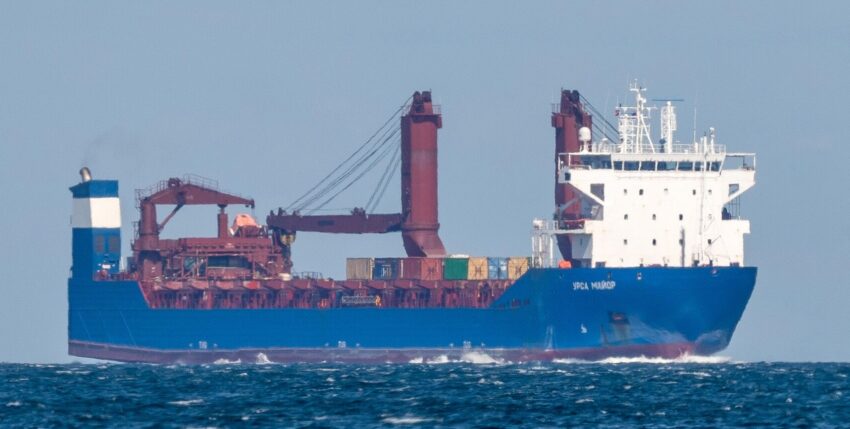The sinking of the "Ursa Major" on 23 December 2024 attracted international attention. The Russian cargo ship sank after an explosion in the engine room in international waters in the Mediterranean between Spain and Algeria. The cause remains unclear, but Moscow claims to be the victim of a terrorist attack. We look at the current movements of the Russian fleet in relation to the Middle-East-North-Africa (MENA) region, particularly Syria and Libya, and raise questions about Moscow's strategic realignment in the Mediterranean.
Ship movements to the Mediterranean
The role of the "Ursa Major" and her companions: The "Ursa Major", formerly known as "Sparta III", was en route from St. Petersburg - according to AIS data to Vladivostok - and was carrying two cranes. International observers suspect that it was acting as part of an evacuation mission from Russian bases in Syria and was actually heading for Libya. The ship was accompanied by the RoRo transport ship "Sparta", while the "Sparta IV" reached St. Petersburg on its return journey from the Mediterranean.
Additional ship movements: On the morning of 25 December, more ships of the so-called Syria Express passed Bornholm, accompanied by the frigate "Soobrazitelniy". Among them were:
- The "General Skobelev": A 150 metre long product tanker, known for regular trips between Russia and Syria. With a past in the so-called "dark fleet", it could also play a role in future missions.
- The "Sparta II": A RoRo container carrier that frequently docked in Tartus (Syria) between 2017 and 2022.
There are also two landing ships from the Northern Fleet "Ivan Gren"the type ship of the class of the same name, and "Alexandr Otrakovsky"a Ropucha class, in the Mediterranean. Both passed through the Strait of Gibraltar on 22 December 2024 - presumably on their way to Tartus.
In contrast, the "Yelnya"a tanker of the Altay class, was transferred from Tartus to the sea area off Algeria. After a port call in Algiers from 17 to 20 December, it has reportedly been off Oran since 20 December.
According to the blog 'Russian Forces in the Mediterranean', which operates under the name Kaptain Loma, a total of ten Russian units are still in the Mediterranean. These include the submarine "Novorossiysk", the two frigates "Admiral Golovko" and "Admiral Grigorovich" and, in addition to the aforementioned "Yelnya", another tanker, the "Vyazma" - a Kaliningradneft class vessel. In addition to the aforementioned landing ships "Ivan Gren" and "Alexandr Otrakovsky", the Ropucha class "Alexandr Shabalin" is a third large landing ship in the Mediterranean. There are also the two reconnaissance units "Yantar" (Yantar class) and "Kildin" (Moma class).
Strategic change: from Syria to Libya?
Preparations for the withdrawal from Syria: Satellite images taken in the days before Christmas 2024 show increased logistical activities by the Russian armed forces in Syria, both in Tartus and at the Russian airbase in Khmeimim. A concentration of military equipment and intensive air traffic indicate an organised evacuation. This could indicate a strategic withdrawal by Moscow from Syria.
Libya option: Libya appears to be an obvious alternative as a strategic base. Indications include:
- Movements of the "Sparta": The ship was spotted on 28 December heading south-east in the central Mediterranean, possibly on its way to Benghazi.
- Existing connections: Tobruk could serve as a new naval base. The harbour city in the east of Libya is the seat of the Libyan secondary government under Prime Minister Osama Hammad (Government of National Stability). It is supported by the so-called Libyan National Army of General Khalifa Haftar, for whom Moscow provides support in the form of mercenaries, weapons and training.
- Strategic importance: A naval base in the Mediterranean is crucial for Russia's geopolitical interests. Tartus in Syria was previously the only naval base outside the Russian mainland. There are photos and reports on social networks about the construction of an airbase in southern Libya.
Consequences and effects - a Libya Express in the future?
A move to Libya could secure Russia's involvement in Africa and change the regional situation. However, analysts emphasise the uncertainties of this step. The geopolitical consequences for the war in Ukraine and for Moscow's reputation among African partners, who are sceptical about Moscow's behaviour in Syria, remain to be seen.
The movements of Russian ships indicate a strategic reorientation. The withdrawal from Syria and the possible establishment of a base in Libya could redefine Russia's role in the Mediterranean region. The Syria Express may now become the Libya Express.







